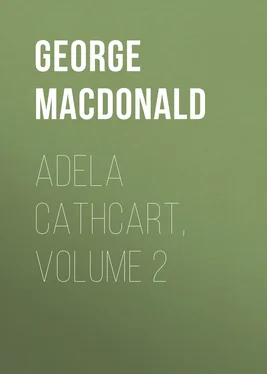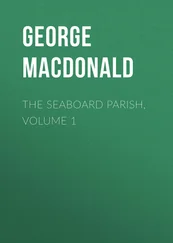George MacDonald - Adela Cathcart, Volume 2
Здесь есть возможность читать онлайн «George MacDonald - Adela Cathcart, Volume 2» — ознакомительный отрывок электронной книги совершенно бесплатно, а после прочтения отрывка купить полную версию. В некоторых случаях можно слушать аудио, скачать через торрент в формате fb2 и присутствует краткое содержание. Жанр: foreign_prose, foreign_religion, literature_19, foreign_antique, на английском языке. Описание произведения, (предисловие) а так же отзывы посетителей доступны на портале библиотеки ЛибКат.
- Название:Adela Cathcart, Volume 2
- Автор:
- Жанр:
- Год:неизвестен
- ISBN:нет данных
- Рейтинг книги:5 / 5. Голосов: 1
-
Избранное:Добавить в избранное
- Отзывы:
-
Ваша оценка:
- 100
- 1
- 2
- 3
- 4
- 5
Adela Cathcart, Volume 2: краткое содержание, описание и аннотация
Предлагаем к чтению аннотацию, описание, краткое содержание или предисловие (зависит от того, что написал сам автор книги «Adela Cathcart, Volume 2»). Если вы не нашли необходимую информацию о книге — напишите в комментариях, мы постараемся отыскать её.
Adela Cathcart, Volume 2 — читать онлайн ознакомительный отрывок
Ниже представлен текст книги, разбитый по страницам. Система сохранения места последней прочитанной страницы, позволяет с удобством читать онлайн бесплатно книгу «Adela Cathcart, Volume 2», без необходимости каждый раз заново искать на чём Вы остановились. Поставьте закладку, и сможете в любой момент перейти на страницу, на которой закончили чтение.
Интервал:
Закладка:
"Oh, dear no!" he answered—"not for days. I am not an idle man like you, Mr. Smith. I belong to the labouring class."
I knew that he could not have it ready.
"Well," I said, "if our friends have no objection, I will give you another myself next time."
"Oh! thank you, uncle," said Adela.—"Another fairy tale, please."
"I can't promise you another fairy-tale just yet, but I can promise you something equally absurd, if that will do."
"Oh yes! Anything you like, uncle. I , for one, am sure to like what you like."
"Thank you, my dear. Now I will go; for I see the doctor waiting to have a word with you."
The company took their leave, and the doctor was not two minutes behind them; for as I went up to my room, after asking the curate when I might call upon him, I saw him come out of the drawing-room and go down stairs.
"Monday evening, then," I had heard the colonel say, as he followed his guests to the hall.
CHAPTER II.
THE CURATE AND HIS WIFE
As I approached the door of the little house in which the curate had so lately taken up his abode, he saw me from the window, and before I had had time to knock, he had opened the door.
"Come in," he said. "I saw you coming. Come to my den, and we will have a pipe together."
"I have brought some of my favourite cigars," I said, "and I want you to try them."
"With all my heart."
The room to which he led me was small, but disfigured with no offensive tidiness. Not a spot of wall was to be seen for books, and yet there were not many books after all. We sat for some minutes enjoying the fragrance of the western incense, without other communion than that of the clouds we were blowing, and what I gathered from the walls. For I am old enough, as I have already confessed, to be getting long-sighted, and I made use of the gift in reading the names of the curate's books, as I had read those of his brother's. They were mostly books of the sixteenth and seventeenth centuries, with a large admixture from the nineteenth, and more than the usual proportion of the German classics; though, strange to say, not a single volume of German Theology could I discover. The curate was the first to break the silence.
"I find this a very painful cigar," he said, with a half laugh.
"I am sorry you don't like it. Try another."
"The cigar is magnificent."
"Isn't it thoroughfare, then?"
"Oh yes! the cigar's all right. I haven't smoked such a cigar for more than ten years; and that's the reason."
"I wish I had known you seven years, Mr. Armstrong."
"You have known me a hundred and seven."
"Then I have a right to—"
"Poke my fire as much as you please."
And as Mr. Armstrong said so, he poked his own chest, to signify the symbolism of his words.
"Then I should like to know something of your early history—something to account for the fact that a man like you, at your time of life, is only a curate."
"I can do all that, and account for the pain your cigar gives me, in one and the same story."
I sat full of expectation.
"You won't find me long-winded, I hope."
"No fear of that. Begin directly. I adjure you by our friendship of a hundred years."
"My father was a clergyman before me; one of those simple-hearted men who think that to be good and kind is the first step towards doing God's work; but who are too modest, too ignorant, and sometimes too indolent to aspire to any second step, or even to inquire what the second step may be. The poor in his parish loved him and preyed upon him. He gave and gave, even after he had no more that he had a right to give.
"He was not by any means a rich man, although he had a little property besides his benefice; but he managed to send me to Oxford. Inheriting, as I suspect, a little tendency to extravagance; having at least no love of money except for what it would bring; and seeing how easily money might be raised there for need true or false, I gradually learned to think less and less of the burdens grievous to be borne, which a subjection to Mammon will accumulate on the shoulders of the unsuspecting ass. I think the old man of the sea in Sindbad the Sailor , must personify debt. At least I have found reason to think so. At the same time I wish I had done nothing worse than run into debt. Yet by far the greater part of it was incurred for the sake of having works of art about me. Of course pictures were out of the question; but good engravings and casts were within the reach of a borrower. At least it was not for the sake of whip-handles and trowsers, that I fell into the clutches of Moses Melchizedek, for that was the name of the devil to whom I betrayed my soul for money. Emulation, however, mingled with the love of art; and I must confess too, that cigars costs me money as well as pictures; and as I have already hinted, there was worse behind. But some things we can only speak to God about.
"I shall never forget the oily face of the villain—may God save him, and then he'll be no villain!—as he first hinted that he would lend me any money I might want, upon certain insignificant conditions, such as signing for a hundred and fifty, where I should receive only a hundred. The sunrise of the future glowed so golden, that it seemed to me the easiest thing in the world to pay my debts there . Here, there was what I wanted, cigars and all. There, there must be gold, else whence the hue? I could pay all my debts in the future, with the utmost ease. How was no matter. I borrowed and borrowed. I flattered myself, besides, that in the things I bought I held money's worth; which, in the main, would have been true, if I had been a dealer in such things; but a mere owner can seldom get the worth of what he possesses, especially when he cannot choose but sell, and has no choice of his market. So when, horrified at last with the filth of the refuge into which I had run to escape the bare walls of heaven, I sold off everything but a few of my pet books"—here he glanced lovingly round his humble study, where shone no glories of print or cast—"which I ought to have sold as well, I found myself still a thousand pounds in debt.
"Now although I had never had a thousand pounds from Melchizedek, I had known perfectly well what I was about. I had been deluded, but not cheated; and in my deep I saw yet a lower depth, into which I would not fall—for then I felt I should be lost indeed—that of in any way repudiating my debts. But what was to be done I had no idea.
"I had studied for the church, and I now took holy orders. I had a few pounds a year from my mother's property, which all went in part-payment of the interest of my debt, I dared not trouble my father with any communication on the subject of my embarrassment, for I knew that he could not help me, and that the impossibility of doing so would make him more unhappy than the wrong I had done in involving myself. I seized the first offer of a curacy that presented itself. Its emoluments were just one hundred pounds a-year, of which I had not to return twenty pounds, as some curates have had to do. Out of this I had to pay one half, in interest for the thousand pounds. On the other half, and the trifle my mother allowed me, I contrived to live.
"But the debt continued undiminished. It lay upon me as a mountain might crush a little Titan. There was no cracking frost, no cutting stream, to wear away, by slowest trituration, that mountain of folly and wickedness. But what I suffered most from was the fact, that I must seem to the poor of my parish unsympathetic and unkind. For although I still managed to give away a little, it seemed to me such a small shabby sum, every time that I drew my hand from my pocket, in which perhaps I had left still less, that it was with a positive feeling of shame that I offered it. There was no high generosity in this. It was mostly selfish—the effect of the transmission of my father's blind benevolence, working as an impulse in me. But it made me wretched. Add to this a feeling of hypocrisy, in the knowledge that I, the dispenser of sacred things to the people, was myself the slave of a money-lending Jew, and you will easily see how my life could not be to me the reality which it must be, for any true and healthy action, to every man. In a word, I felt that I was humbug. As to my preaching, that could not have had much reality in it of any kind, for I had no experience yet of the relation of Christian Faith to Christian Action. In fact, I regarded them as separable—not merely as distinguishable, in the necessity which our human nature, itself an analysis of the divine, has for analysing itself. I respected everything connected with my profession, which I regarded as in itself eminently respectable; but, then, it was only the profession I respected, and I was only doing church at best. I have since altered my opinion about the profession, as such; and while I love my work with all my heart, I do not care to think about its worldly relations at all. The honour is to be a servant of men, whom God thought worth making, worth allowing to sin, and worth helping out of it at such a cost. But as far as regards the profession , is it a manly kind of work, to put on a white gown once a week, and read out of a book; and then put on a black gown, and read out of a paper you bought or wrote; all about certain old time-honoured legends which have some influence in keeping the common people on their good behaviour, by promising them happiness after they are dead, if they are respectable, and everlasting torture if they are blackguards? Is it manly?"
Читать дальшеИнтервал:
Закладка:
Похожие книги на «Adela Cathcart, Volume 2»
Представляем Вашему вниманию похожие книги на «Adela Cathcart, Volume 2» списком для выбора. Мы отобрали схожую по названию и смыслу литературу в надежде предоставить читателям больше вариантов отыскать новые, интересные, ещё непрочитанные произведения.
Обсуждение, отзывы о книге «Adela Cathcart, Volume 2» и просто собственные мнения читателей. Оставьте ваши комментарии, напишите, что Вы думаете о произведении, его смысле или главных героях. Укажите что конкретно понравилось, а что нет, и почему Вы так считаете.












